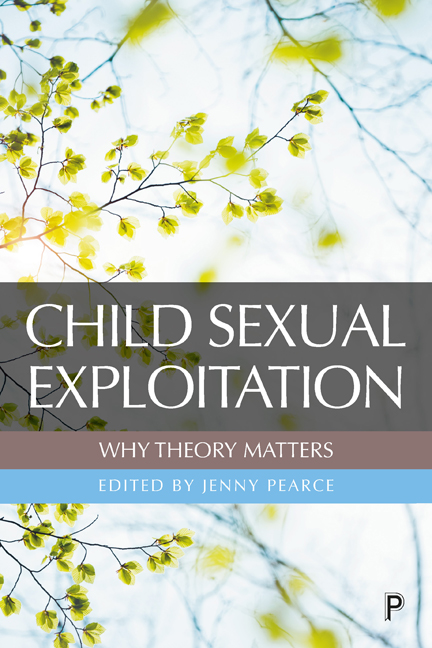Book contents
- Frontmatter
- Contents
- List of Figures and Tables
- Notes on Contributors
- Editor’s Acknowledgements
- Foreword
- 1 Bringing Theory Home: Thinking About Child Sexual Exploitation
- 2 Moving Beyond Discourses of Agency, Gain and Blame: Reconceptualising Young People’S Experiences of Sexual Exploitation
- 3 Child Sexual Exploitation, Discourse Analysis and why we Still Need to Talk About Prostitution
- 4 Contextual Safeguarding: Theorising the Contexts of Child Protection and Peer Abuse
- 5 ‘Losing Track of Morality’: Understanding Online Forces and Dynamics Conducive to Child Sexual Exploitation
- 6 Understanding Adolescent Development in the Context of Child Sexual Exploitation
- 7 Some Psychodynamic Understandings of Child Sexual Exploitation
- 8 Understanding Trauma and its Relevance to Child Sexual Exploitation
- 9 Social Support, Empathy and Ecology: A Theoretical Underpinning for Working with Young People who have Suffered Child Sexual Abuse or Exploitation
- 10 Using an Intersectional Lens to Examine the Child Sexual Exploitation of Black Adolescents
- 11 What’s Gender Got to do With It? Sexual Exploitation of Children as Patriarchal Violence
- 12 Understanding Models of Disability to Improve Responses to Children with Learning Disabilities
- 13 Some Concluding Thoughts
- Index
8 - Understanding Trauma and its Relevance to Child Sexual Exploitation
Published online by Cambridge University Press: 10 March 2021
- Frontmatter
- Contents
- List of Figures and Tables
- Notes on Contributors
- Editor’s Acknowledgements
- Foreword
- 1 Bringing Theory Home: Thinking About Child Sexual Exploitation
- 2 Moving Beyond Discourses of Agency, Gain and Blame: Reconceptualising Young People’S Experiences of Sexual Exploitation
- 3 Child Sexual Exploitation, Discourse Analysis and why we Still Need to Talk About Prostitution
- 4 Contextual Safeguarding: Theorising the Contexts of Child Protection and Peer Abuse
- 5 ‘Losing Track of Morality’: Understanding Online Forces and Dynamics Conducive to Child Sexual Exploitation
- 6 Understanding Adolescent Development in the Context of Child Sexual Exploitation
- 7 Some Psychodynamic Understandings of Child Sexual Exploitation
- 8 Understanding Trauma and its Relevance to Child Sexual Exploitation
- 9 Social Support, Empathy and Ecology: A Theoretical Underpinning for Working with Young People who have Suffered Child Sexual Abuse or Exploitation
- 10 Using an Intersectional Lens to Examine the Child Sexual Exploitation of Black Adolescents
- 11 What’s Gender Got to do With It? Sexual Exploitation of Children as Patriarchal Violence
- 12 Understanding Models of Disability to Improve Responses to Children with Learning Disabilities
- 13 Some Concluding Thoughts
- Index
Summary
Introduction
Child sexual exploitation (CSE) is a form of child sexual abuse which may expose children and young people to a range of traumatic physical, sexual and relational experiences. For some of these children and young people, early life exposure to abuse and neglect and/or time in public care (Scott and Skidmore 2006) represent additional traumatic experiences that have helped shape how they view themselves and interact with others (Herman 1992). Research on child sexual abuse and other forms of child maltreatment indicates that survivors need access to services that recognise trauma and seek to mitigate the impact of traumatic experiences on their lives (Finkelhor and Browne 1985).
Trauma can be defined as ‘any exposure to an extraordinary experience that presents a physical or psychological threat to oneself or others and generates a reaction of helplessness and fear’ (American Psychiatric Association 2013). More simply, a traumatic event overwhelms typical adaptations to human life (Herman 1992). Traumatic experiences can take many forms, and may include natural disaster, car accidents, war, childhood maltreatment or community violence. Research on adverse child experiences (ACEs) indicates that exposure to prejudice, poverty, bereavement, being forced to take on adult responsibilities, or difficult adjustments (for example, migration, asylum) are also traumatic (Bush 2018), and the effects of being exposed to traumatic experiences are varied, often lasting into adulthood (Felitti et al 1998).
Understanding CSE through the lenses of contemporary trauma theory and research can provide insight into the experiences of children and young people affected by CSE. This chapter will provide a brief overview of the research on trauma, specifically in relation to the impact of developmental and complex trauma and sexual abuse, and the growing body of research on trauma-informed approaches to practice. It will consider how trauma responses are developed while enduring extreme stress, and how these responses may be evident among children and young people with CSE experiences. This chapter will also consider how systems designed to protect and support traumatised children and young people often contribute to their re-traumatisation (Harris and Fallot 2001). It will explore principles of trauma-informed practice that are useful in meeting the needs of young people victimised by CSE (Hampton and Leiggi 2017), discuss how trauma-informed approaches align with strengthsbased and relationship-based approaches to CSE practice (Lefevre et al 2017), and how such approaches can help practitioners understand and promote resilience (Harvey 2007).
- Type
- Chapter
- Information
- Child Sexual Exploitation: Why Theory Matters , pp. 151 - 172Publisher: Bristol University PressPrint publication year: 2019



